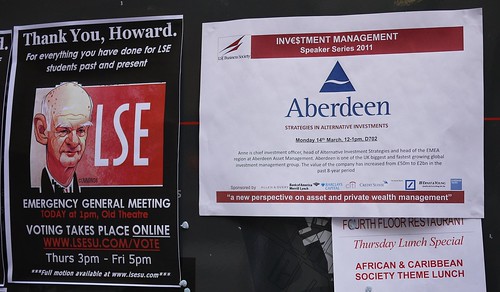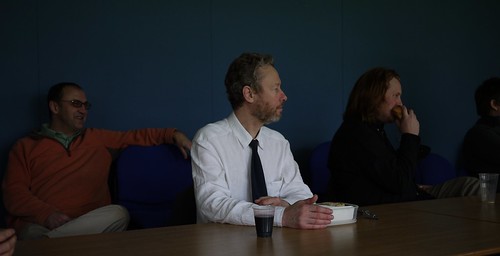Old building, new student
The two faces of LSE
Libya: the military realities
Really and useful and informative piece by Paul Rogers in openDemocracy.net. Excerpt:
Libya’s air-force has over 300 combat-aircraft, but most are Soviet-era planes with a limited capability, and many are in storage – though there are also some Mirage F-1 planes that have been upgraded by French technicians. The force's strike-aircraft could have an impact if the conflict moves east towards the rebel stronghold of Benghazi, as equally could the substantial number of transport-aircraft and attack-helicopters. Again, the sudden reversal of alliances is highlighted by the presence in Libya’s transport fleet of fifteen C-130H Hercules planes from the United States, and by the Italian arms company Finmeccanica’s recent refurbishment of CH-47 transport helicopters.
These are the military realities. The larger strategic issue is that the Gaddafi regime will only survive beyond the short term if it regains control of most of Libya’s oil-and-gas industry. These resources are widely scattered; most of the energy fields are in the east and southeast of the country which accounts for around 80% of current production, with the remaining fields south of Tripoli in the west.
But the numerous oilfields, wherever they are located, are much less important than Libya’s coastal processing plants, refineries and export terminals. These are the strategically important centres, and the regime has to retrieve the majority of them without delay.
Zawiya, west of Tripoli towards the border with Tunisia, is one of the main outlets for the western oilfields. The Az-Zawiya oil-refinery west of the city is a key facility that the regime needs in order to maintain its own fuel supplies. This explains why the town has become is a key site of conflict between Gaddafi's forces and his opponents who have been occupying the city (see "The colonel fights back", Economist, 10 March 2011).
In addition to the plants near Tripoli, five terminals that handle oil-and-gas exports from eastern Libya generate the great majority of the country’s export revenues. The easternmost one is the large Marsa El Hariga terminal at Tobruk, on the border with Egypt; to the west are the Zuetina and Marsa El Brega tterminals south of Benghazi, the latter the site of Libya's liquefied natural-gas plant. These three are beyond Gaddafi's reach at present, while the two others – at Ras Lanuf (already the centre of conflict) and Es Sider (beside Gaddafi’s hometown of Sirte) are being closely contested by Gaddafi’s forces.
The three sites west of Benghazi – Zuetina, Brega and Ras Lanuf – are likely to be the Gaddafi loyalists’ key objectives in coming days. The central challenge for Gaddafi's military planners is to move ground forces eastwards: a difficult logistical task since any large armoured vehicles, and especially tanks and self-propelled artillery, must be moved by road on large articulated transporters. Libya has relatively few of these and they can be rendered impotent by sabotage of bridges. Smaller vehicles may be able to divert across a dried-up river-bed but tank transporters most definitely can't.
In turn this means that airpower – transport aircraft as well as helicopters and strike-aircraft – will become increasingly important as the civil war develops. Both the direct military implications of this shift, and the possibility of greater numbers of civilians being killed by air-strikes, raises the second crucial issue in the evolving conflict: whether outside intervention will prevent Libya’s air-force from operating.
Hmmm… Sounds as though some kind of limited no-fly effort might be useful.
The Pogue family iPad2 review. (Or should that be ‘revue’?)
I know — it’s twee. But full marks for trying.
Colleagues
At a lunchtime seminar.
Retroscope
More retro stuff. Shot though the viewing lens of my ancient Rolleiflex.
Absolute hattery
Milord Acton wearing my Baily hat. All hats corrupt, but fedoras corrupt absolutely.
Photographed using the cod Hipstamatic iPhone App.
The Asian economic ‘miracle’
Intellectual Property (IP) theft by China is a theme to which Mark Anderson often returns. But even by his standards this blog post is pretty explicit. Extracts:
Two weeks ago, I was visited by two people speaking for China, representing a new company whose job would be to – well, they described it, but it was a bit vague. During this description, we talked about IP and China, and they pointed to the new high-speed trains China is building everywhere.
Indeed, China has laid more high-speed rail, and plans for more of these showcase trains, than any other country in the world.
My visitors pointed to these trains as examples of how China was now developing its own IP, and not just depending on IP theft or forced disclosure from others.
Last week I learned the rest of the story: how Japan (Kawasaki Heavy Industries and others) brought this technology to China, hoping to make money, and now are watching as their IP reappears in Chinese products owned by Chinese companies, and the Japanese get little or nothing.
That’s the story of modern mercantilism, and of the so-called China Miracle.
And:
Last quarter, a letter was reportedly sent from the Prime Minister’s office in the U.K., to the country’s top 300 CEOs, informing them that they should consider all of their current IP crown jewels to have been compromised.
All of them.
This brings the level of security concern to a level not yet anticipated by most executives: what if the cost of broachable security is your company’s future ability to compete and survive?
Ask Boeing, Cisco, Kawasaki, Qualcomm, 3Com, Sony, Google, General Electric, BASF, or Microsoft how they feel about all this. Most will dissemble in public, but tell you the truth offline; and many are rapidly coming clean, even in their public comments, as GE CEO Jeffrey Immelt did not long ago.
You are now CEO of a 50-year-old global corporation with, say, 60,000 employees. And the PM’s letter sits open on your desk.
You call in your CIO, close the door, show him the letter. Have we been hacked? you ask. He goes into geekspeak, describing various levels of difficulties, generally safe behavior, all seems well today, no guarantees or ways to tell.
What? You ask. There are no ways to tell if our crown jewels have been stolen by some competitor?
Here are some of the crown jewels obtained by China in the last couple of decades: the top U.S. nuclear warhead design, from Livermore Labs; wing fabrication machinery and blueprints, from Lockheed-Martin; selected Boeing airframe designs; navigation and rocket design for Intercontinental Ballistic Missiles (specifically, the Long March series), from both Boeing and Lockheed; high-speed router designs from Cisco; the source code to Windows, from Microsoft; complete car designs from Chevy and Ford; advanced chip and fab designs, from IBM; high-speed rail systems from Japan; etc.
And you think your company’s IP is somehow safe?
What we are watching, currently, is the largest theft in global history, happening in front of our own eyes. And while one group is busy exclaiming at the wonder of China (and South Korea and Japan) making all that progress and money in their turn, another group is now recognizing the mercantilist model in its third iteration.
I haven’t been able to find any independent corroboration of the alleged letter from David Cameron, but I haven’t had time to do much digging yet.
Ode to Steve
Warning for sensitive souls: contains rude words.
It prompted me to download the 8mm home movie app for the iPhone. Another lovely example of using sophisticated computing to produce primitive retro effects. No wonder normal people think that geeks are nuts!
Thanks to Andrew Ingram for spotting it.






